Particle scattering - Study guides, Revision notes & Summaries
Looking for the best study guides, study notes and summaries about Particle scattering? On this page you'll find 185 study documents about Particle scattering.
Page 3 out of 185 results
Sort by

-
PHYSICS FINAL EXAM 2024 WITH CORRECT ANSWERS AND MULTIPLE QUESTIONS
- Exam (elaborations) • 26 pages • 2024
- Available in package deal
-
- £10.34
- + learn more
Matter is measured in _____. - kilograms Energy is measured in? - joules or electron volts Atoms and molecules are the fundamental building blocks of? - matter Radio waves, light and x-rays are all examples of ____energy. - Electromagnetic A moving object has _____ energy. - kinetic The energy of x-rays is _____. - electromagnetic The basic quantities measured in mechanics are _____, _____, and _____. - mass, length, time An example ...

-
Physics OCR A Level Nuclear and Particles Physics: Module 6: Particles and Medical Physics: Questions with Complete Solutions
- Exam (elaborations) • 12 pages • 2024
- Available in package deal
-
- £7.55
- + learn more
How does the alpha-scattering experiment give evidence of a small, dense nucleus? A few alpha particles bounce back. This wouldn’t happen if the positive charge in the atom was distributed evenly throughout (as in the Plum Pudding Model), which suggests they must be hitting a dense positive charge. The fact it only happens to a very small number of alpha particles shows the nucleus must be small. What are the main constituents of an atom? ● Proton ● Neutron ● Electron How many ...
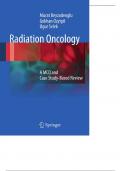
-
Radiation Oncology_ A MCQ and Case Study-Based Review.pdf
- Exam (elaborations) • 498 pages • 2024
-
- £17.02
- + learn more
1 Radiation Physics . . . . . . . . . . . . . . . . . . . . . . . . . . . . . . . . . . . . . . . . . . . 1 1.1 Test 1.1A. Radiation Physics . . . . . . . . . . . . . . . . . . . . . . . . . . . . . . . 1 1.2 Test 1.1A. Explanatory Answers . . . . . . . . . . . . . . . . . . . . . . . . . . . . 3 1.3 Test 1.2A. Radiation Physics . . . . . . . . . . . . . . . . . . . . . . . . . . . . . . . 8 1.4 Test 1.2A. Explanatory Answers . . . . . . . . . . . . . . . . . . . . . . . . . . . . 10 1.5 Te...
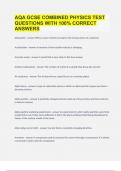
-
AQA GCSE COMBINED PHYSICS TEST QUESTIONS WITH 100% CORRECT ANSWERS
- Exam (elaborations) • 19 pages • 2023
-
- £11.53
- + learn more
Absorption When a wave transfers energy to the energy stores of a material. Acceleration A measure of how quickly velocity is changing. Accurate result A result that is very close to the true answer. Activity (radioactive) The number of nuclei of a sample that decay per second. Air resistance The frictional force caused by air on a moving object. Alpha decay A type of radioactive decay in which an alpha particle is given out from a decaying nucleus. ...
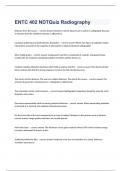
-
ENTC 402 NDTQuiz Radiography Question and answers rated A+ 2023/2024
- Exam (elaborations) • 5 pages • 2023
- Available in package deal
-
- £10.34
- + learn more
ENTC 402 NDTQuiz Radiography Question and answers rated A+ 2023/2024ENTC 402 NDTQuiz Radiography Distance from the source - correct answer Newton's Inverse Square Law is useful in radiography because it indicates how the radiation intensity is affected by: Compton Scattering and photoelectric absorption - correct answer Which two types of radiation-matter interactions account for the majority of attenuation in typical industrial radiography? Silver halide grains - correct answer Une...
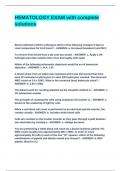
-
HEMATOLOGY EXAM with complete solutions
- Exam (elaborations) • 13 pages • 2024
-
- £8.35
- + learn more
Blood collected in EDTA undergoes which of the following changes if kept at room temperature for 6-24 hours? a. Increased hematocrit and MCV To remove fresh blood from a lab coat you would: c. Apply a 3% hydrogen peroxide solution then rinse thoroughly with water Which of the following achromatic objectives would be an oil immersion objective: c. N.A. 1.25 A blood smear from an infant was examined and it was discovered that there were 20 nucleated erythrocytes for each 10...
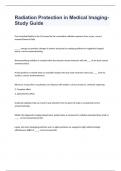
-
Radiation Protection in Medical Imaging- Study Guide with 100% correct answers
- Exam (elaborations) • 4 pages • 2024
- Available in package deal
-
- £10.74
- + learn more
First recorded fatality in the US caused by the cumulative radiation exposure from x-rays. correct answersClarence Daily _____ energy can produce changes in atomic structure by creating positively or negatively charged atoms. correct answersIonizing Bremsstrahlung radiation is created when the electron stream interacts with the ___ of an atom correct answersnucleus A beta particle is created when an unstable isotope with too many neutrons emits a(n) ____ from its nucleus. correct answer...
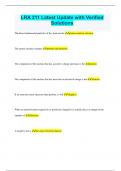
-
LRA 211 Latest Update with Verified Solutions
- Exam (elaborations) • 13 pages • 2023
- Available in package deal
-
- £7.95
- + learn more
LRA 211 Latest Update with Verified Solutions The three fundamental particles of the atom are the proton, neutron, electron The atomic nucleus contains protons and neutrons The component of the nucleus that has a positive charge and mass is the protons The component of the nucleus that has mass but no electrical charge is the Neutron If an atom has more electrons than protons, it will Negative When an atom becomes negatively or positively charged it is usually due to a change in the number ...
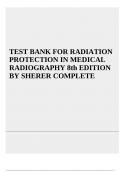
-
TEST BANK FOR RADIATION PROTECTION IN MEDICAL RADIOGRAPHY 9th EDITION BY SHERER | VERIFIED
- Exam (elaborations) • 71 pages • 2023
-
- £25.86
- + learn more
Consequences of ionization in human cells include 1. creation of unstable atoms. 2. production of free electrons. 3. creation of highly reactive free radicals capable of producing substances poisonous to the cell. 4. creation of new biologic molecules detrimental to the living cell. 5. injury to the cell that may manifest itself as abnormal function or loss of function. a. 1, 2, and 3 only b. 2, 3, and 4 only c. 3, 4, and 5 only d. 1, 2, 3, 4, and 5 ANS: D 2. Which of the following i...
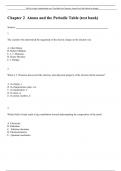
-
Test Bank for Chemistry Atoms First 2nd Edition by Burdge latest complete A+ graded
- Exam (elaborations) • 72 pages • 2023
-
- £12.81
- + learn more
Test Bank for Chemistry Atoms First 2nd Edition by Burdge latest complete A+ graded Chapter 2 Atoms and the Periodic Table (test bank) Student: 1. The scientist who determined the magnitude of the electric charge on the electron was A. John Dalton B. Robert Millikan C. J. J. Thomson D. Henry Moseley E. J. Burdge 2. When J. J. Thomson discovered the electron, what physical property of the electron did he measure? A. its charge, e B. its chargetomass ...

£5.50 for your revision notes multiplied by 100 fellow students... Do the math: that's a lot of money! Don't be a thief of your own wallet and start uploading yours now. Discover all about earning on Stuvia


